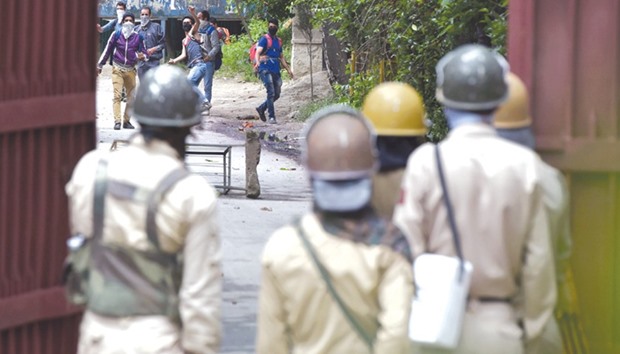Musa distances himself from 70-year-old separatist movement and aligns himself with ideals of Al Qaeda
A serious rift has emerged within the decades-old insurgency against Indian rule in Jammu and Kashmir, with a top militant commander vowing to establish an Islamic system in the Himalayan region and repudiating the goal of an independent nation.
Zakir Musa, the commander of Kashmir’s largest anti-India militia, has explicitly distanced himself from the 70-year-old independence movement in the Kashmir Valley as well as from elements who wish to merge with Pakistan, declaring his fight is “exclusively for Islam, so that Shariah is established here”.
The pronouncements, issued in audio statements posted on social media in the past weeks, signal a growing ideological divide between Kashmir’s old guard of separatist leaders, and a new, social-media savvy generation of rebels.
Musa, 22, has emerged in the past year as the leading face of the ongoing militancy in the state.
He succeeded another militant, Burhan Wani, as the commander of the militant group Hizbul Mujahideen. Wani’s death last July in a clash with Indian soldiers triggered weeks of protests that paralysed the valley. Security forces killed more than 90 civilians and injured around 15,000, many permanently blinded by pellet guns.
Protests - including some led for the first time by young women - have broken out again in past weeks and by-elections in April saw record low turnouts, pointing to deep disillusionment among Kashmiris and raising fears of another bloody summer ahead.
Musa is part of a new generation of anti-India fighters whose numbers are small - roughly 210, according to police estimates - but who enjoy strong support among the public, and whose exploits and opinions are widely shared on social media.
“Everyone is with him,” a student, Yawir, told the Guardian at Government Degree College in Pulwama, where last month students clashed with security forces, triggering a wave of protests across the state.
In a video statement circulated online in March, the bearded, soft-spoken Musa appealed to protesters such as the Pulwama students “not to fall for nationalism”. “I see that many people in Kashmir are engaged in a war of nationalism, which is forbidden in Islam,” he said.
The fight in the region should “not be for the sake of Kashmir,” he said. “It should be exclusively for Islam so that Shariah is established here.”
Another video released by the group in April went further, criticising Pakistan.
Appropriating the slogan of Al Qaeda in the Indian Subcontinent, a local branch of the terrorist group, an unnamed militant is shown telling villagers: “This war is for Shariah or shahadat (martyrdom).”
“Pakistani flag is not part of Shariah,” he says. “Why do you wave the Pakistani flag? Anyone who waves the Pakistan flag will be our enemy.”
Before his death, Wani had appeared to drift towards the rhetoric of global militant movements such as Al Qaeda, calling in 2015 for a “caliphate (to be) established in Kashmir”. But he had stopped short of disowning the independence movement or criticising Pakistan.
The hardening position of the militant group has put pressure on older leaders, some of who took up arms during the first wave of militancy in the 1990s, but have since turned to politics to achieve their ends.
Last week the All Parties Hurriyat Conference, an alliance of Kashmiri separatist groups comprising the traditional leaders of the movement, issued a careful press release that appeared to distance itself from the militants’ comments.
“Terrorism and freedom movement are poles apart,” it said. “Our movement has nothing to do with these world level groups (Islamic State and Al Qaeda) and practically they are non-existent in our state.” - Guardian News and Media

Students throw stones during clashes between government forces inside a collage in Srinagar yesterday. Students have been protesting since April after security forces raided a college in Pulwama in south Kashmir, injuring some 50 students.
